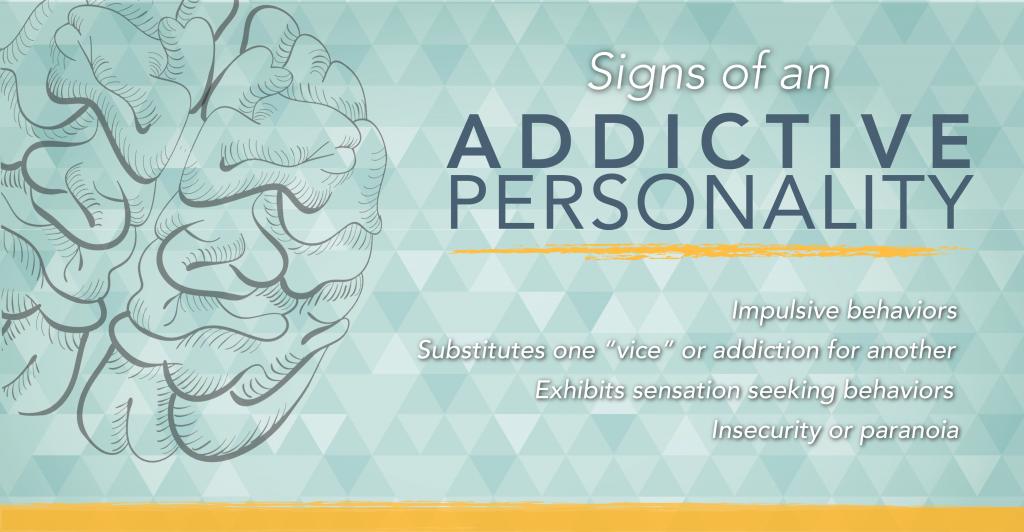
You don’t have to be actively using drugs or alcohol to have an addictive personality. In fact, recognizing the traits in an addictive personality is one preventative measure to avoid drug and alcohol addiction.
There are many symptoms of addictive personality disorder overlapping other mental disorders including obsessive compulsive disorder, anxiety and depression, and borderline personality disorder. These overlapping disorders lend themselves to the recognition that a person’s genetic predisposition, environmental stressors, and mental health play a huge role in a person’s vulnerability to addiction.
What Is Addictive Personality Disorder?
There is no one clear definition for what makes up an addictive personality disorder, though many common factors arise. A person who demonstrates frequent impulse-driven behaviors, or compulsivity, combined with sensation-seeking behaviors is more likely to encounter trouble with “vices” or addiction and may be coping with an addictive personality disorder.
Someone who exhibits these symptoms may be labeled a “workaholic” or they might be seem obsessed with some area of their lives like fitness. They often become addicted to nicotine, coffee, and other substances (polysubstance abuse is common), food, gambling, and exhibit other vices or habitual behaviors. Often these individuals also suffer from higher rates of anxiety, insecurity, and even paranoia. As a result, they may appear antisocial on some level, preferring to be alone or limiting their interactions with others.
Despite some of the issues associated with addictive personality disorder, these individuals appear often to have strong leadership skills. Probably based on apparent decisive attitudes and their ability to absorb risks.
Signs and Symptoms of Addictive Personality Disorder
- Exhibits sensation seeking behaviors
- Impulsive behaviors
- Compulsive behaviors
- Antisocial personality
- Suffers from feelings of abandonment
- Insecurity or paranoia
- Forms co-dependent relationships
- Substitutes one “vice” or addiction for another
- Anxiety and depression
- Past trauma or ongoing significant stress
Not everyone who demonstrates addictive tendencies will exhibit these behaviors with severity. In some cases, a person may be aware of an internal struggle and have some of the outward symptoms under control. However, the biochemistry of the brain associated with these traits appears linked to a higher risk for drug and alcohol addiction, and those who cope with these issues can benefit from awareness of the risks.
What The Research Tells Us About Addictive Personality Disorder
What current research reveals about addictive personality disorder is that the common core factors of sensation-seeking, impulsivity, and compulsivity, when occurring alone do not lead to addictive behaviors, but where all three traits are seen, addiction to one or more substances is likely.
Even someone addictive personality who has never tried drugs or alcohol behaves in similar ways to the drug or alcohol addicted individual, seeking out new experiences or sensations to fuel their euphoria. They also demonstrate a similar lack of control over their behaviors, and compulsively seek out their next adventure or high, despite known physical or emotional tolls. These individuals cannot wait for delayed reward and will seek out immediate gratification, often without regard to consequence.
Stress factors play an important role in the severity of symptoms that manifest with addictive personality disorder. Someone experiencing or recovering from severe trauma or stress may distract themselves with symptom-related behaviors. Not unlike someone with OCD who begins hand-washing obsessively after a bad car accident or stress at work, a person with addictive personality disorder, may push harder, seek a greater thrill, or work out obsessively to lessen the effects of trauma and stress.
Treatment Of Addictive Personality Disorder
Someone with signs of an addictive personality disorder will benefit from cognitive behavioral therapy over medications. Cognitive behavioral therapy is an ideal form of therapy to help a person assess and address feelings associated with compulsivity and impulsivity, and alter their response to situations that trigger those behaviors.
Someone with moderate symptoms can still benefit from cognitive behavioral therapy in addressing stress and encouraging proactive coping strategies. This can turn something like awareness of a disorder into a powerful preventative tool.
A co-diagnosis of addictive personality disorder along with a drug or alcohol addiction will both need to be addressed if seeking drug or alcohol rehabilitation. Failing to do so may lead to relapse as a someone with an addictive personality might very well substitute one addiction with another.
Recovery From Addiction Is Possible
Even if you are told you have an addictive personality, or are currently struggling with an addiction to drugs or alcohol, recovery is possible. DrugRehab.org is an online resource connecting you with the professional support and evidence-based, comprehensive treatment options available to meet your individual needs.
Contact us and speak to someone today to discover a more rewarding life in recovery.


